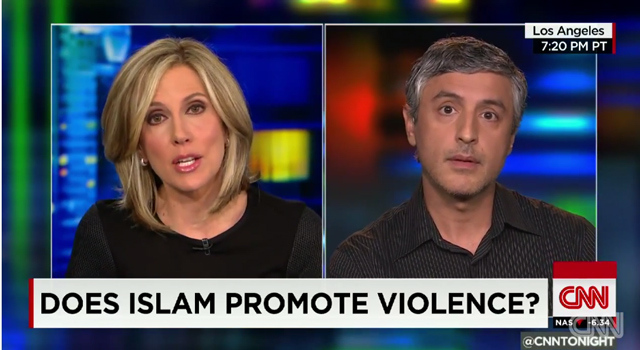Conversations About Islam: CNN Versus Reza Aslan
CNN Versus Reza Aslan

These are trying times to be a practising Muslim. Grotesque images of ISIS executions, sectarian violence in several countries in the Middle East, continuing Israeli crimes against humanity, rising public animosity against Islam and its defenders in the so-called liberal Western democracies are but a small fraction of the issues that any public-minded Islamic intellectual has to contend with on a daily basis. However the biggest threat of all is probably CNN.
I was tempted to write when I came across this (http://bit.ly/YXegwE) particular instance of, what Jon Stewart fondly refers to as “BullShit Mountain”-talk during a television interview with religious scholar and political commentator Reza Aslan. The CNN panel which consisted of Alisyn Camerota and Don Lemon began by framing the debate in as neutral and sophisticated terms as possible ---
“Defenders of Islam insist that it is a peaceful religion. Others disagree and point to the primitive treatment in Muslim countries of women and other minorities.”
What is a peaceful religion anyway? Is violence the exclusive preserve of some religion? I guess CNN does not believe in fine distinctions, like the one between correlation and causation. The anchors then play a brief clip where Bill Maher (the comedian-turned-Islamic-expert) claimed that the Islamic world has too much in common with the ISIS. Reza Aslan immediately points out the lack of sophistication in the argument when you club problems like female genital mutilation with Islam in one fell swoop of intellectual laziness. He goes on to inform us about the fact that it is an African cultural problem (much like Bound Feet was in China) and afflicts even Christian nations in Africa. Reza points out that we can’t make facile universal claims about archaic cultural practices, mistreatment of women and then blame it all on Islam because there are Islamic countries like Malaysia, Indonesia and Turkey which disprove those statements. His point in the entire interview is that the praxis of a religion depends predominantly on what an individual, a society and its historical context bring to the plate. Decontextualization and generalizations are the worst enemies of any real understanding of a foreign culture, which is exactly what the CNN anchor does in the next few minutes, thus exhibiting the fabulous attention-span of a child.
Aslan raises some very troubling political issues as well, acknowledging that the conditions which women face in countries like Saudi Arabia or Iran are deplorable and need to be discussed and opposed. He points out that in the same time frame when ISIS was carrying out its gruesome campaign of violence and beheadings, Saudi Arabia beheaded 19 of its citizens. (and some of them for non-lethal crimes) There is no conversation about that in international fora because they are apparently a “trusted ally” of the US or an oil-source, depending on which ideology you subscribe to. The United States is also in no position to express righteous indignation at human rights abuses in these countries because it is one of the countries with the highest number of death penalties carried out every year. There is no legitimate conversation about the conditions of women in extremist Muslim nations like Saudi Arabia or Iran because people are too lazy to care or too shackled by conflicts of interest, in this case, strategic national interests.
The CNN article in a desperate bid to twist the take-away from this debate harps on how Reza Aslan’s tone was hostile during the interview, when in fact, he was smiling and patient with the panel. This is the kind of journalism that is dangerous. Everyone is born ignorant, but it takes hard work and serious commitment to networks like CNN to stay stupid forever. Instead of graciously acknowledging a fair point, the anchors were indulging in trying to prove Reza wrong by bringing up one or two specific one-off incidents in Indonesia and Malaysia. Conservatives are likely to use this as fodder to strengthen their beliefs in the “inherent primitive nature” of certain religious and legal systems and justify cold-blooded military moves which are driven entirely by the lust for power and resources.
All this is fairly obvious to any critical observer. I would actually go on a limb here and say that the events in the past few months are not an indictment of a particular religion, but rather faith in general. American debates about evolution and climate change, ISIS horrors, Israel’s continued brutalities against a helpless population are all pieces of a larger puzzle where religion corrupts the mental life. People are inherently manipulative and social structures which mediate your relationship with some unknown, all-powerful deity are bound to find much traction in such an unfair, unjust world. There is no need for religion in the Garden of Eden. On this planet however, we need to find solace in humanity.
If conversations about religion in general (Islam in particular) could segue into conversations about humanity, the world would be a much better place.
-------------------------------
P.S. For those who consider Christianity to be a “peaceful religion”, riddle me this
“Where would Christianity be if Jesus has got eight to fifteen years with time off for good behavior?” --- James Donovan



